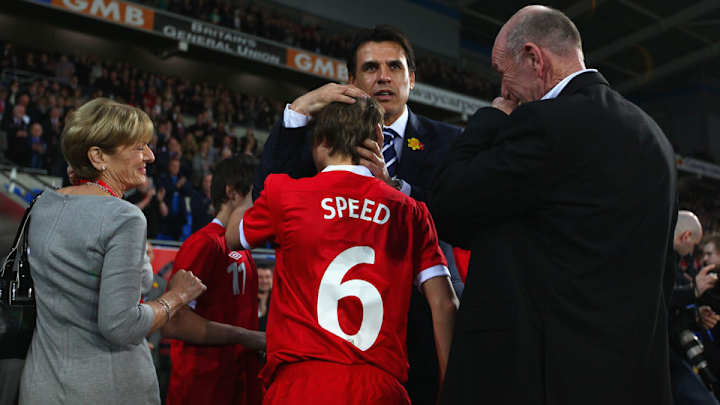Chris Coleman, Wales remain inspired by memory of Gary Speed

Chris Coleman remembers the phone call clearly.
“Speedie’s dead.”
Coleman was in Greece managing Larissa. He thought the person at the other end of the line was referring to David Speedie, the former Liverpool and Coventry striker. But slowly the truth dawned. Not Speedie, but Speeds: his old friend and teammate, the man who had pipped him to the Wales job, Gary Speed. He’d hanged himself, a coroner ruling there was insufficient evidence to determine whether he’d meant to do it or not.
That was November 2011. Speed had been Wales manager for a little under a year. When he’d gotten the job, he’d rung Coleman to ensure there’d be no awkwardness, joking about how comfortable the chair in the manager’s office was. The early signs under Speed had been promising: five wins and five defeats in 10 games, a run that included victories over Switzerland and Bulgaria in Euro 2012 qualifying and lifted Wales to 45th in the FIFA rankings, its highest position in 17 years.
Wales manager Coleman brilliant in devising plan, aura to oust Belgium
Coleman was appointed to succeed him, a task he found emotionally extremely difficult, as is laid out in Chris Wathan’s excellent book about Wales’s qualification for these Euros, "Together Stronger." For a while, Coleman did what he thought Speed would have wanted. He stopped thinking himself. In part it was because he recognized the players would be resistant to change, but it was also in part because he had been numbed; he couldn’t make difficult decisions.
“I felt I was stabbing [Speed] in the back because I was sat in his seat, where he should have been,” Coleman told Wathan. “It was horrendous.”
Wales’s form slipped, reaching a low in Belgrade in September 2012 with a 6-1 defeat to Serbia, a “dark, dark night,” as Coleman’s assistant Kit Symons described it. Symons remembers sitting in the airport with Coleman, the players a little way away, everybody silent. Coleman said he felt “crushed.” It was then that Coleman realized things had to change.
[youtube:https://youtu.be/GQmEwBw4Tls]
But it took time for the changes to take effect. In September 2014, in the first qualifier for the Euros, Wales was drawing 1-1 in Andorra with nine minutes remaining. Coleman was aware that if Wales didn’t find a winner, he would probably be sacked. He would have failed his country and Speed. Then Gareth Bale smacked in a free kick, embarrassment was averted, and Wales was on its way.
First Look: Portugal vs. Wales in Euro 2016 semifinals
For the following game, at home to Bosnia-Herzegovina, Coleman made a tactical change.
In his whole managerial career, he had used a back three just once, on the final day of the 2005-06 season as Fulham beat Middlesbrough 1-0. But he recognized that with the players available it was the best way of providing a platform for Bale, whose explosiveness on the break was his side’s great strength.
A 0-0 draw against demoralized opponents was no great vindication and the back four returned for the two following games.
But in Haifa, Coleman saw it as the best way of fitting Joe Ledley, Joe Allen and Aaron Ramsey into midfield. Wales was excellent and beat Israel 3-0. The back three was there to stay. Perceptions of Coleman began to change. His playing career had been ended by a car crash and in 2003, aged 33, he was the surprise choice to be manager of Fulham and led a side that had been tipped for relegation to ninth. But then his reputation drifted.
At Real Sociedad he became a laughing stock when he missed training after attending a student disco and blamed his absence on flooding caused by a faulty washing machine. When a lost passport almost caused him to miss a game in Macedonia FYR, it seemed a similar pattern of haplessness was repeating. But the switch to a back three suggested a level of tactical acuity that had been overlooked, and there is no doubting the spirit of togetherness in the Wales camp. Coleman has cut an increasingly statesmanlike presence as the tournament has gone on.
But just because Coleman has come into his own and has been doing things his way, does not mean Speed has been forgotten, far from it. Wales’s fans have chanted Speed’s name before every game in France, while he is never far form Coleman’s thoughts.
“I always think of him,” Coleman said this week. “Everyone else will say they know him through football. That was not the case with me. I met him through football, but then we were friends since 10 or 11.
“That is when our paths crossed and we stayed mates. I don’t need football to remind me of ‘Speeds.’ Everyone else can do that. But when we beat Belgium, I did not just think of Speeds as he was one of my friends. I have lost two or three friends who have died too young. It is horrible. I can’t say because of that game I thought of Speeds, as I don’t need Belgium or a big game to think of him. I always think of him.”

An accomplished author of multiple books, Jonathan Wilson is one of the world’s preeminent minds on soccer tactics and history.